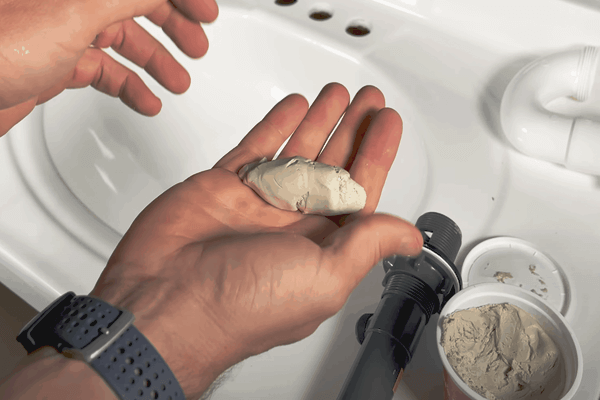Whether it’s a dripping tap, clog in the sink, or low water pressure, you’ve most likely experienced similar plumbing issues in the bathroom.
Problems with plumbing can range from small to very serious issues, and these problems are obvious in old buildings. The problems may seem endless and they are not always in our budget.
To deal with some of these plumbing issues in our homes, we may have to use plumbers putty.
Plumbers putty is a soft, clay-like material used to seal drains and fixtures in sinks, bathtubs, showers, and around toilets. It ensures a watertight fit that reduces the chances of leaks. Normally, plumbers putty is used to cover the base of taps and drains. Since this putty remains soft for a long time, it’s an excellent choice for situations where a reversible, watertight seal is necessary.
Plumbers putty is a soft, pliable sealing compound that can be made from a variety of ingredients, but most products (or brands) make use of clay and linseed oil. Others use limestone, talc, or fish oil.

Now that we know what a plumber putty is, its makeup, and what it is commonly used for, let’s find out if it hardens and why. We would also learn what we can do when it hardens and how to prevent the putty from hardening.
Contents
Does plumber putty get hard?
Yes, plumbers putty can become hard.
When you open a container of plumbers putty and take some out, it feels hard and cold. If the putty is a few years old, perhaps it is no longer moldable or soft since it has dried out.
What to do when plumbers putty hardens
When your plumbers putty hardens, do not panic or dash out to buy a new one. Look around you and use a few simple household ingredients to make your putty softer. Try any of these methods:
Use linseed oil
Cover the putty with some linseed oil and let this stay for a day or two.
Wear hand gloves and knead the mixture to the texture you desire. This process will help to restore the putty to its original pliable state.
You can use any cooking oil if there is no linseed oil.
Use water and hand lotion
Wipe a flat surface clean, then put on hand gloves. Take some plumbers putty out of its container and place it on the flat surface. Mix about 30 ml of water into the putty and knead by hand until it is pliable.
Squirt a little of the available hand lotion into the mixture and knead again. Your putty should be soft afterwards.
Use hot water
Retain the putty in its container or jar, (or any other container that you have) pour some lukewarm water on top of it, and leave this to soak overnight.
After the overnight treatment, pour hot water into a large bowl and place the container of plumbers putty in the bowl. Put on hand gloves, squeeze and fold the putty until it is soft and easy to mould.
Use hair gel and microwave
Another way to make the hardened putty soft is to put it in a microwaveable bowl, add some hair gel into the hard plumbers putty, and knead until it softens, then microwave at a standard temperature for about 2 minutes.
Let it cool down before you check to see if the consistency is what you need.
You may have to continue adding hair gel, kneading, and microwaving until you are satisfied.
How to prevent plumbers putty from hardening
Most people imagine that, after making use of plumbers putty, they can simply replace the lid and hope that when they need it (in a few months or longer), it will remain as soft as it was when they bought it. They wish they could keep the plumbers putty in its original state for years.
Unfortunately, this rarely happens because they don’t know how to prevent it from hardening. However, there is a way out.
Pour water on top of the plumbers putty before you replace the lid. Doing so will create an air-tight seal that will help to retain the malleable nature of the putty.
No matter how long it takes before you require the use of the putty, you can rest assured that it will not be hard.
When you’re ready to use it again, simply open the lid, pour out the little water, use a paper towel or any cloth to absorb the water and your putty is ready to be reused.
FAQs
Does plumbers putty stay soft?
Plumbers putty remains permanently flexible. This is due to the non-setting compound composition of the putty.
Normally, plumbers putty will remain soft and pliable, however like most compounds, it will lose the ability to be a malleable sealant if you leave it for a very long time.
It is however possible to keep it soft for as long as you want by adding a little water on top of the putty and replacing the air-tight lead or adding oil to the putty.
Can you use plumbers putty in plumbing pipes?
No. Plumbers putty can be used for many things but it is not an adhesive and lacks the strength of one, so it should not be used in plumbing pipes.
As a word of advice, plumbers putty should never be used anywhere that pressurized plumbing connections exist, such as pipes because it is not suitable for such tasks.
How long does it take for plumbers putty to set?
Since there is no drying time, because plumbers putty never dries, you can start using the drain or tap after installing the plumbers putty.
For premium results, it is better to wait for a few more hours for the putty to set adequately before you start using your taps, sinks, or drains.
The putty gets the chance to expand when you wait longer as it sets, and that could make a difference.
Conclusion
Never fear that you’re wasting your money when you have to buy a can of plumbers putty because you’re afraid it will harden. Use just a little out of it for the emergency repair, and store it the proper way for a while because you may need it a few months later.
Plumbers putty should be soft and ready for use if you use the method described in this article to store it. If it is hardened and difficult to roll into shape, then it’s probably because it is too old and dried out, but with patience, some oil, or hot water, the situation can be salvaged.
